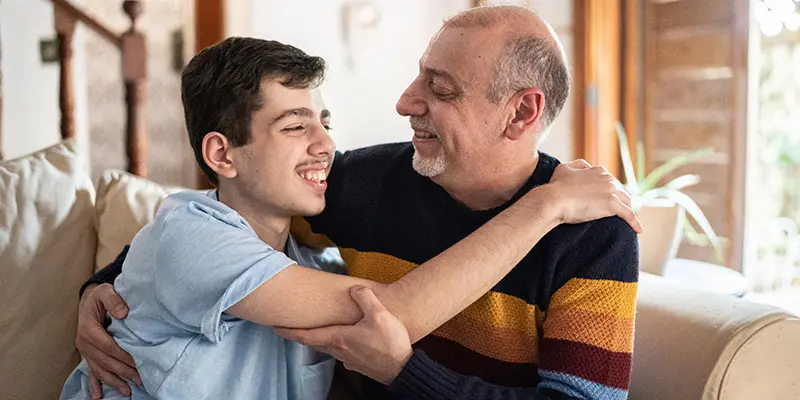
Having a child diagnosed with autism can be devastating, but it can also open the door to better understanding and support that can help that child live a happier and more fulfilling life. That’s what comedian and influencer Laura Clery expressed when she posted a video to social media on Sept. 3, 2021, announcing that her son Alfie has autism. The achingly beautiful video quickly garnered over 13 million views on Facebook alone, along with thousands of comments from other parents offering suggestions on helpful therapies and strategies. In her loving tribute to her quirky, creative, and curious son, Clery says, “I understand why he would get the support and accommodations he needs, but why erase harmless autistic behaviors?”
Getting a diagnosis of autism at a young age provides an opportunity to engage in early interventions that may be beneficial in offering the support needed while nurturing the unique skills of the autistic individual.
Getting a diagnosis of autism at a young age provides an opportunity to engage in early interventions that may be beneficial in offering the support needed while nurturing the unique skills of the autistic individual. Click To TweetWHAT IS AUTISM?
Autism spectrum disorder (ASD) is a brain-based disorder that is characterized by developmental delays, communication problems, abnormal social skills, learning disabilities, and behavioral problems—all ranging from mild to severe.
Signs of autism typically appear by age 2 or 3, but they can occur earlier in some children. The following list shows some of the symptoms of the developmental disorder. Because autism is a spectrum disorder, not all people with the condition will exhibit all of these symptoms.
ASD symptoms can include the following:
- Poor eye contact
- Delayed speech
- Unresponsiveness
- Having an intense focus on something
- Trouble understanding social cues
- Difficult reading facial expressions
- Repetitive movements (such as rocking back and forth and hand flapping)
- Repeating words or phrases
- Having difficulty dealing with changes in routines
- Self-harmful behaviors (such as head-banging)
- Having difficulty playing with other children
- Social withdrawal
- Having difficulty carrying on a conversation
- Having a flat or sing-song tone of voice
- Increased or decreased sensitivity to sensory input (clothing, lights, noise, temperature)
STRENGTHS IN AUTISM
Although people with autism face numerous challenges, they also possess many strengths associated with the condition, including:
- Long-term memory skills
- Math, music, art, computer, or science skills
- Good visual learners
- Rule-based thinking
For a 2019 study appearing in Autism in Adulthood, researchers conducted interviews with 24 autistic adults to determine which autism-related traits helped them in their lives at work, in relationships, and more. The most common responses included:
- Ability to hyperfocus
- Good memory
- Attention to detail
- Creativity
Other attributes mentioned by the autistic adults in this study included honesty and loyalty, as well as empathy (especially for animals or other people with autism). For this study, the researchers also looked at how these strengths may be affected by conventional treatments for autism. “If aspects of autism can be beneficial, advantages may be lost if interventions seek to minimize autistic traits in a blanket way,” they write. This is a concern that many autistic people and parents of autistic children may have.
AUTISM AND THE BRAIN
Brain SPECT imaging studies at Amen Clinics on more than 1,000 children and adults with ASD show that it is not one thing. Autism affects brain function in multiple regions and in a variety of ways. For example, some people with ASD have overactivity in certain brain areas while others have low activity. Still, others may have both high activity in some areas and decreased activity in other regions.
Among the patients at Amen Clinics, those with high activity patterns are associated with repetitious speech and behavior, rigid thinking, problems with change, mood instability, anxiety, and emotional meltdowns. Low activity patterns are typically seen in people with poor physical coordination, learning problems, communication challenges, sensory processing issues, and trouble with abstract thinking.
Some of the many brain regions affected by autism may include the following:
- Temporal lobes: These structures are involved in language, auditory and visual processing, facial recognition, emotional regulation, social attachment, and memory. When there is abnormal activity here, there are problems with these functions.
- Cerebellum: Located at the back bottom of the brain, the cerebellum’s functions include physical coordination, gait, learning, processing speed (how quickly a person thinks), and attention circuits. When this region isn’t operating optimally, there can be problems with these functions.
- Anterior cingulate gyrus: This area is considered the brain’s gear shifter and allows you to go from one thought to the next and from one action to another. Abnormal activity in this region is associated with hyperfocus, repetitive actions, and having difficulty with change.
Additional research shows reduced connectivity among various brain regions in people with autism, changing the way the brain processes information. Brain imaging research makes it clear that not all autistic brains are the same. Because of this, interventions need to be tailored to a person’s brain and individual needs.
WHEN AUTISM GOES UNTREATED OR IS MISDIAGNOSED
The wide-ranging goals of treating autism include helping overcome developmental delays, improving the capacity for understanding social cues, enhancing the ability to speak and learn, strengthening mood regulation, learning self-soothing techniques, and nurturing existing skills. When ASD goes untreated, is misdiagnosed, or diagnosis is delayed, negative symptoms associated with the condition may worsen over time.
Without adequate support, children may not develop competent skills with regards to learning, speech, or social interactions. Adults who have not received appropriate treatment may have trouble living independently, may be unemployed, and may struggle with relationships.
Autism can also impact physical and mental health, according to the 2017 National Autism Indicators Report: Developmental Disability Services and Outcomes in Adulthood. Among adults with autism, 51% had at least one co-existing physical health condition. Studies have found high rates of diabetes, thyroid disease, high blood pressure, high cholesterol, gastrointestinal disorders, nutritional deficiencies, and more.
In the realm of mental health, rates of co-occurring conditions are higher among adults with autism compared with the general population. Approximately 54% of adults with ASD have at least one psychiatric condition, such as anxiety, mood disorders, psychotic disorders, and others. Behavioral issues—including being disruptive, engaging in self-harm, or being destructive—are also common, affecting 46% of autistic adults. The rates of mental health issues in adults with autism increase with age.
INTERVENTIONS FOR AUTISM
Treatment plans for ASD typically involve a variety of therapies and techniques. In general, the earlier treatment begins, the better. However, it’s never too late to start. Some interventions are backed by strong scientific evidence while others are still being explored. The following list includes a variety of strategies that some parents of autistic children and some individuals with autism may find helpful.
- Early interventions aim to produce improvements in communication, behavior, and cognitive abilities in young children.
- Applied behavioral analysis is a process intended to change specific behaviors.
- Cognitive behavioral therapy is an effective form of psychological treatment that helps people replace negative or unhelpful thinking patterns and behaviors with ones that promote more positive moods and improve daily functioning and quality of life.
- Social skills training can improve specific aspects of social interactions, including eye contact, verbal greetings, and more.
- Play therapy may be beneficial for children as a way to improve social skills.
- Supportive therapies—such as music therapy, art therapy, or massage therapy—may be helpful in enhancing social interactions and relaxation for individuals with ASD.
- Sensory integration aims to improve responses to sensory input by having people with autism engage in a “sensory diet” that involves a variety of activities, such as wearing a weighted vest or being wrapped in fabric.
- Diets that eliminate foods that can make autism worse—such as gluten and casein (milk protein)—should be an important part of any treatment plan.
- Supplementing with probiotics, which helps promote healthy bacteria in the gut, is important because there is a gut-brain connection in autism. Gut dysfunction is common in people with ASD, according to a 2019 study in Autism Research.
- Nutritional supplements may be helpful to address nutritional deficiencies in those with ASD. For example, a 2020 review reports that children with autism may have low levels of vitamins B1, B6, B12, A, and D, as well as other important minerals. In addition, most Americans have low levels of omega-3 fatty acids, which are critical for healthy brain development.
Taking a cookie-cutter approach to treating autism will never work. Finding the interventions that work best for you or your child is key.
Autism spectrum disorder and other mental health issues can’t wait. At Amen Clinics, we’re here for you. We offer in-clinic brain scanning and appointments, as well as mental telehealth, clinical evaluations, and therapy for adults, teens, children, and couples. Find out more by speaking to a specialist today at 888-288-9834 or visit our contact page here.





My nephew has a high degree of autism. We are looking for some early intervention since he is only 6 years old. It is good to know how important this support is. I like how you said without it, they may not have have independence as an adult or a good job, not to mention relationship hassles.
Comment by Vivian Black — January 11, 2022 @ 7:36 AM
I want to get tested myself. I suspect that I have Aspergers. Most of my life I’ve had a hard time connecting with people. Attention deficit disorder, and dyslexia also run in my family.
Comment by Sharon Tyler — April 29, 2022 @ 4:03 AM
I prefer the term autism spectrum difference. I was diagnosed in my forties, which explained difficulties throughout my whole life. My brain is wired differently and I do not require treatments, I do better with extra support and understanding.
Comment by Lin Reinbold — April 29, 2022 @ 9:12 AM
Overall I found this article supportive and neurodiversity affirming- until I saw ABA as an intervention. Countless autistic adults who have been through this process have been traumatised and it is NOT considered ND affirming. Please don’t recommend this practice for Autistic children.
Comment by Nicci — April 29, 2022 @ 2:47 PM
I was recently diagnosed on the autistic spectrum at the age of 56, after 22 years of (now failing) marriage and having 2 children, who are currently still living with me. I am worried that I could have made mistakes as a wife and mother that I might not even be aware of, but I can’t find much advice online which is relevant to my situation. Can you help? (I live in the UK, in case that makes a difference.)
Comment by Tracey — May 6, 2022 @ 1:00 AM
My 8year old grandson has all 10 symptoms of Aspergers but has never been officially diagnosed. My grown soon to be divorced adult daughter is a Marriage Family Therapist who thinks her son will be “labeled” if he is given an official diagnosis on his records. She doesn’t think he needs behavioral therapy which is surprising. They both live in my home which is causing serious problems. He is home schooled and has very limited interaction with other children. I am extremely concerned if he doesn’t get the much needed help now it will effect his long term future happiness. COVID has made things much worse. I am looking for guidance on how families cope with this devastating condition and with my daughter who is in complete denial.
Comment by Laurel Mendoza — June 2, 2022 @ 7:55 AM
I wish my parents had been more informed about how important support is in the developmental years. I was not diagnosed until I was 19, and by that time I was already living on my own. I could not keep a job or make friends and ended up homeless for a time. I am now in a stable home and going to behavioral therapy for my autism, and I have a job that feels permanent. I hope that the stigma around autism will go away so that other children will not struggle the way that I have.
Comment by Connor Greene — October 22, 2022 @ 10:19 PM
Hi I have the symptoms if autism. I've struggled with learning disabilities all my life. I'm 53 and married my children are now in their late 20's. I didn't think anything was really odd till I had a meltdown. I had to leave my job cause the stress was too much. I'm also suffering from bypolar and major depressive disorder. I need help financially.
Comment by Nancy — October 26, 2022 @ 8:37 PM
My brother was diagnosed in his early years but wasn't treated or helped because special schools and therapies are very expensive in my country. I'm done with school now and is hoping for a good job to be able to afford the bills. I hope it's not too late for him at 22😢😢
Comment by Ifeoma — October 28, 2022 @ 1:19 PM
I was diagnosed with ASD age 40 and this will be my death sentence!!!
Comment by kristin — October 28, 2022 @ 3:36 PM
I have recently been diagnosed with ASD. I'm 48, reading the above article and the related comments has given me great comfort in the fact I am not alone. Knowing has put my life into context and I now feel I have a sword to battle my mental health with. Ty.
Comment by Gareth John — December 11, 2022 @ 6:57 AM
Why were you guys all diagnosed so late in your lives???
I'm autistic and was diagnosed when I was 12 or so…yes I struggled in school before then and still"now"at 26 almost 27 with social interactions and stuff that gets me overwhelmed but at least everyone including my parents are much more understanding about how I work so I'm never punished for my meltdowns!
Comment by Eva — December 18, 2022 @ 10:47 PM
I just got to know my daughter has autism and I don’t know how to deal with it but your post has helped me a lot. I will definitely take help of respite care autism (https://theadventureteam.com.au/ ) and Laura Clery's video celebrating her son Alfie's autism diagnosis is a heartwarming reminder of the potential for understanding and support. It's not just about the challenges but also recognizing the unique strengths that individuals with autism possess. Early diagnosis allows for early interventions that can make a significant difference and I will also take the necessary initiative now. Thanks.
Comment by Respite Care Autism — November 7, 2023 @ 10:11 AM